趣味B(形容词副词介词动词)(湖南省湘潭市湘乡市第三中学周洪敦)
文档属性
| 名称 | 趣味B(形容词副词介词动词)(湖南省湘潭市湘乡市第三中学周洪敦) |

|
|
| 格式 | rar | ||
| 文件大小 | 1.1MB | ||
| 资源类型 | 教案 | ||
| 版本资源 | 通用版 | ||
| 科目 | 英语 | ||
| 更新时间 | 2007-10-26 00:00:00 | ||
图片预览


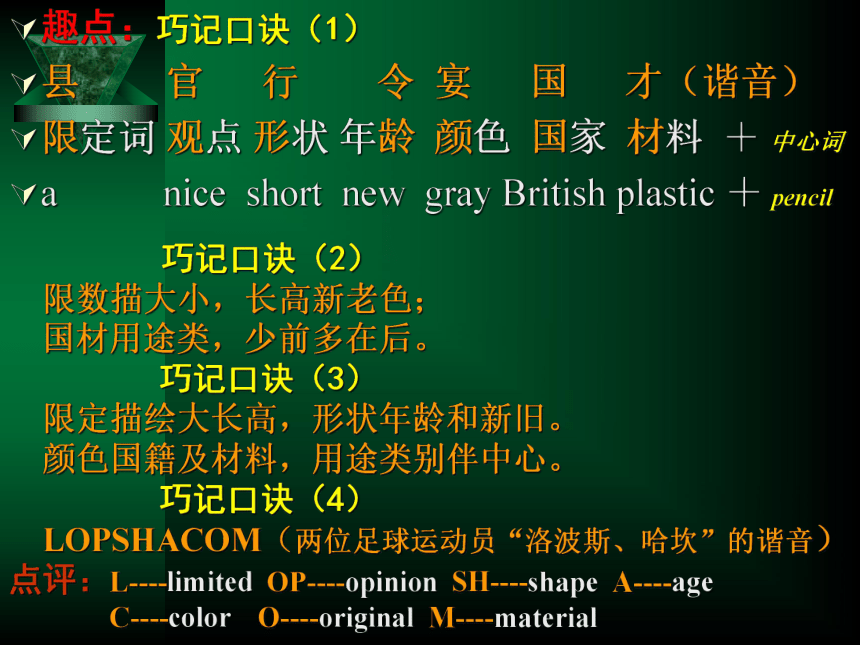
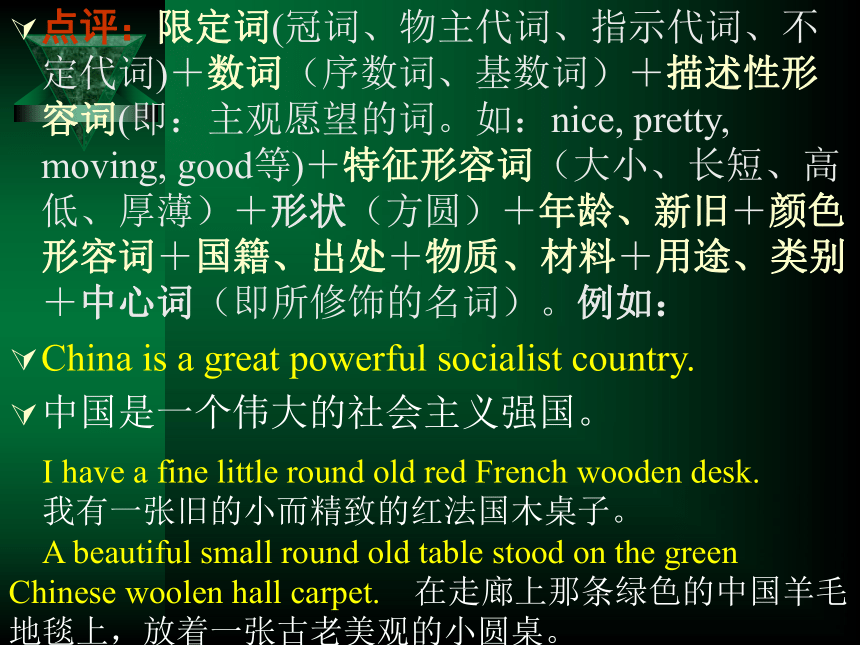
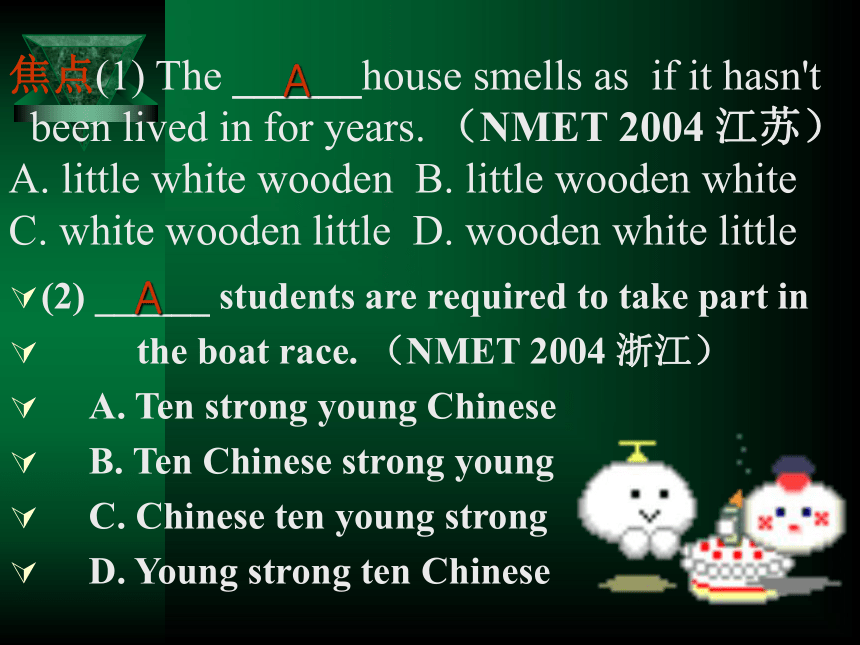
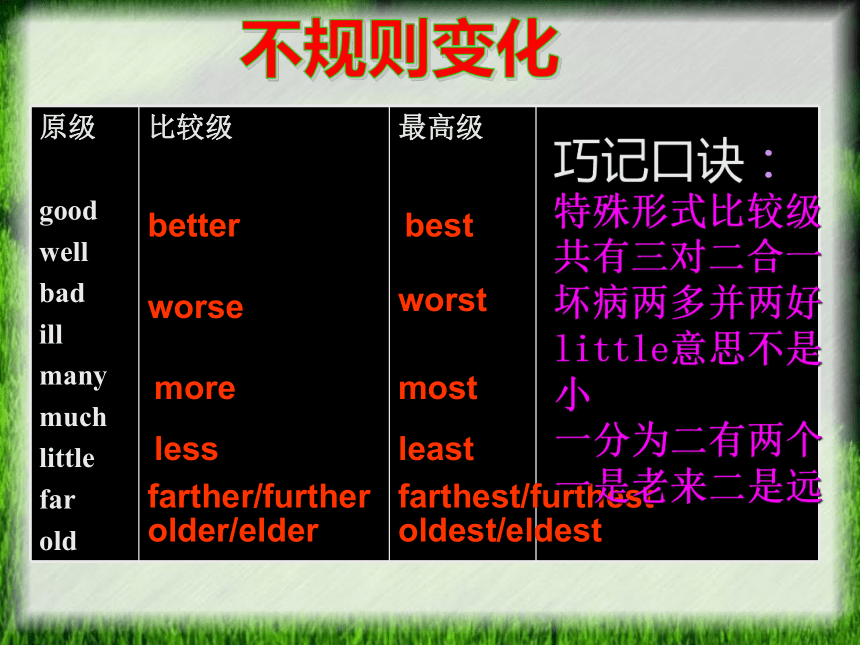


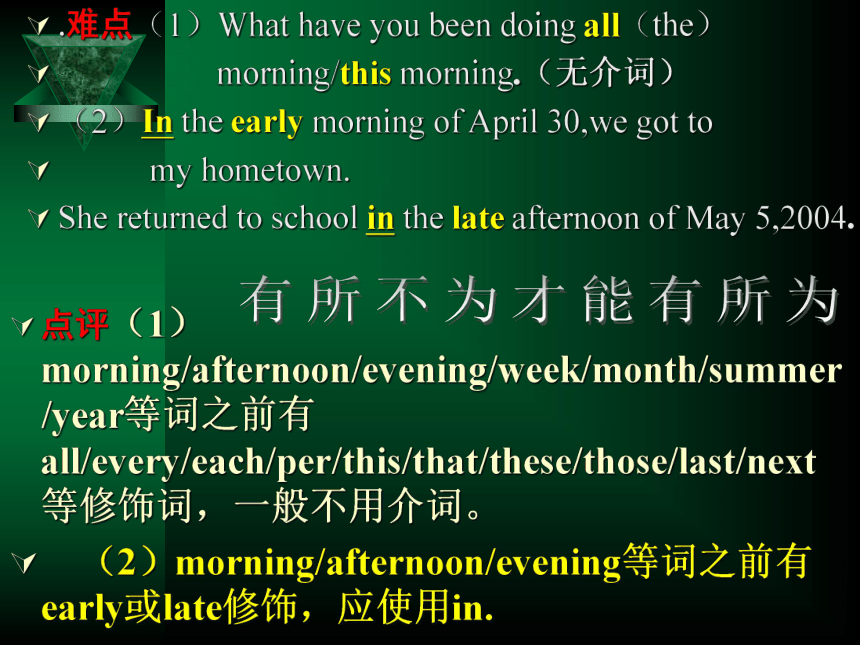
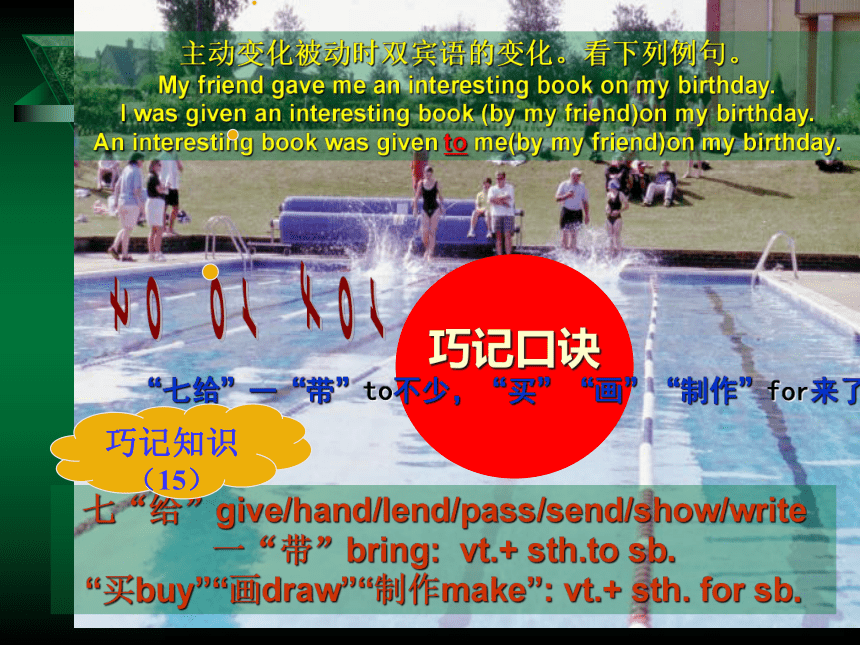
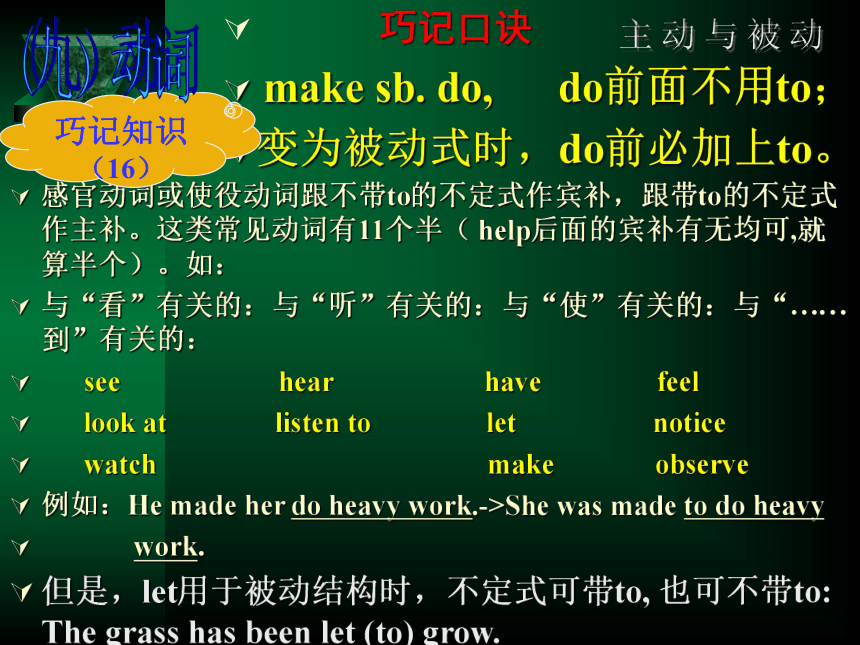
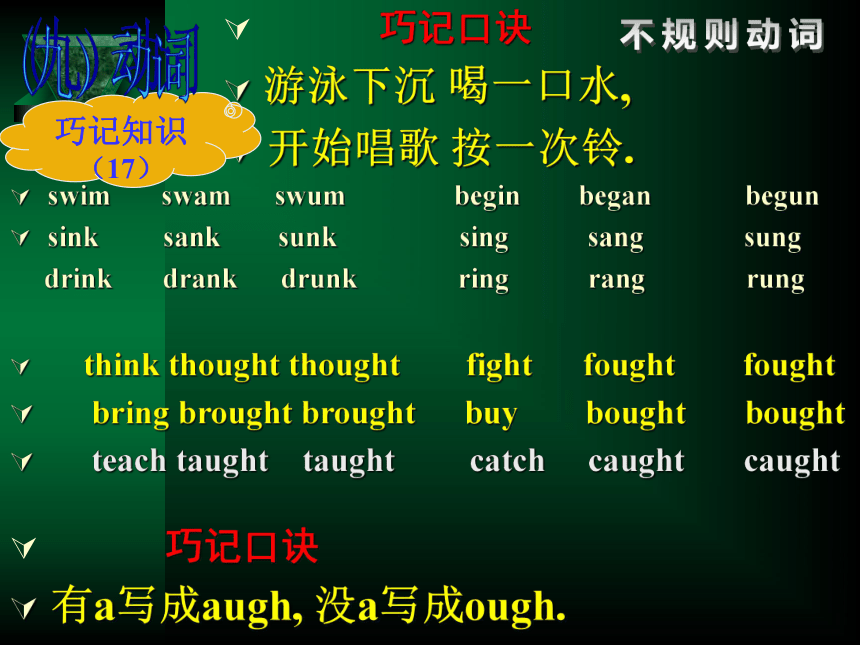
文档简介
课件34张PPT。第二讲湖南省湘乡三中英语组
周洪敦 制作趣味英语讲座Interesting English Lecture 点拨:此题考查形容词的排列顺序,解题思路是“论资排辈”,采取“排列法”, 答案B.方法如下: 考点1.—How was your recent visit to
Qingdao?
—It was great. We visited some
friends, and spent the days at
the seaside.(NMET 1997)
A. few last sunny B. last few sunny
C. last sunny few D. few sunny last巧记知识(12)书山有路“趣”为径,
学海无涯“乐”作舟。(六)形容词 巧记口诀(2) 限数描大小,长高新老色; 国材用途类,少前多在后。 巧记口诀(3) 限定描绘大长高,形状年龄和新旧。 颜色国籍及材料,用途类别伴中心。 巧记口诀(4) LOPSHACOM(两位足球运动员“洛波斯、哈坎”的谐音) 点评:L----limited OP----opinion SH----shape A----age C----color O----original M----material趣点:巧记口诀(1)
县 官 行 令 宴 国 才(谐音)
限定词 观点 形状 年龄 颜色 国家 材料 + 中心词
a nice short new gray British plastic + pencil I have a fine little round old red French wooden desk. 我有一张旧的小而精致的红法国木桌子。 A beautiful small round old table stood on the green Chinese woolen hall carpet. 在走廊上那条绿色的中国羊毛地毯上,放着一张古老美观的小圆桌。点评:限定词(冠词、物主代词、指示代词、不定代词)+数词(序数词、基数词)+描述性形容词(即:主观愿望的词。如:nice, pretty, moving, good等)+特征形容词(大小、长短、高低、厚薄)+形状(方圆)+年龄、新旧+颜色形容词+国籍、出处+物质、材料+用途、类别+中心词(即所修饰的名词)。例如:
China is a great powerful socialist country.
中国是一个伟大的社会主义强国。焦点(1) The ______house smells as if it hasn't been lived in for years. (NMET 2004 江苏) A. little white wooden B. little wooden white C. white wooden little D. wooden white little(2) ______ students are required to take part in
the boat race. (NMET 2004 浙江)
A. Ten strong young Chinese
B. Ten Chinese strong young
C. Chinese ten young strong
D. Young strong ten ChineseAAbetter bestworseworstless more mostfarther/furtherolder/elderleast farthest/furthestoldest/eldest不规则变化巧记口诀:
特殊形式比较级
共有三对二合一
坏病两多并两好
little意思不是小
一分为二有两个
一是老来二是远
?巧记口诀I’m too tired to go for a walk;besides,it is snowing hard outside now.
Li Hao is a very strong fellow;besides, he is fond of sports. 副词besides句中插,“雪上加霜”或“锦上添花”。 besides可用作副词,意为“况且,而且,加之,再者”,相当于what’s more。在句中作插入语,用逗号与该句子其他部分隔开,使该句子与前面的句子在意义上含“雪上加霜”或“锦上添花”的意味。例如:巧记知识(13)(七)副词时间介词速记歌
年月周前要用in,日子前面却不行。
遇到几号要用on,上午下午又是in。
要说某日上下午,用on换in才能行。
午夜黄昏用at, 黎明用它也不错。
at用在时分前, 说“差”要用to,
说“过”要用past,分前点后别颠倒。
多说多练牢牢记, 莫让岁月空蹉跎。 Beijing was liberated in January, 1949.
I saw her on January 1st.
At dawn they started.
-What time is it by your watch?
-A quarter to eight.
It is twenty past eleven now(八)介词巧记知识(14)巧记口诀巧记口诀.难点(1)What have you been doing all(the)
morning/this morning.(无介词)
(2)In the early morning of April 30,we got to
my hometown.
She returned to school in the late afternoon of May 5,2004.点评(1) morning/afternoon/evening/week/month/summer/year等词之前有all/every/each/per/this/that/these/those/last/next等修饰词,一般不用介词。
(2)morning/afternoon/evening等词之前有early或late修饰,应使用in.有所不为才能有所为巧记口诀
“七给”一“带”to不少,“买”“画”“制作”for来了。 主动变化被动时双宾语的变化。看下列例句。
My friend gave me an interesting book on my birthday.
I was given an interesting book (by my friend)on my birthday.
An interesting book was given to me(by my friend)on my birthday.七“给”give/hand/lend/pass/send/show/write
一“带”bring: vt.+ sth.to sb.
“买buy”“画draw”“制作make”: vt.+ sth. for sb.to or for巧记知识(15) 巧记口诀
make sb. do, do前面不用to;
变为被动式时,do前必加上to。感官动词或使役动词跟不带to的不定式作宾补,跟带to的不定式作主补。这类常见动词有11个半( help后面的宾补有无均可,就算半个)。如:
与“看”有关的:与“听”有关的:与“使”有关的:与“……到”有关的:
see hear have feel
look at listen to let notice
watch make observe
例如:He made her do heavy work.->She was made to do heavy
work.
但是,let用于被动结构时,不定式可带to, 也可不带to: The grass has been let (to) grow.巧记知识(16)主动与被动(九)动词 巧记口诀
游泳下沉 喝一口水,
开始唱歌 按一次铃. swim swam swum begin began begun
sink sank sunk sing sang sung
drink drank drunk ring rang rung
think thought thought fight fought fought
bring brought brought buy bought bought
teach taught taught catch caught caught巧记知识(17)不规则动词(九)动词 巧记口诀
有a写成augh, 没a写成ough. 能跟现在分词作宾语补足语的常见动词有这些,看看有什么好方法可以将它们记住:
make、let、have、look at、see、watch、hear、listen to、notice、feel。
对了,用“三让、三看、两听、注意感觉”。多简单!巧记口诀 开始离去,借来还,(begin/leave/go/borrow/come/return)
出生入死,买到家。
(bear/join/die/buy/arrive)我们要表达“我来到本市已五年了。”不能译为:
I have come to this city for five years.
遇到这种情况,可采取下列译法:
I have been in this city for five years.(口语说法)
It’s been five years I’ve come to this city.(口语说法)
It’s been five years since I came to this city.(口语说法)
It’s five years since I came to this city.(正规说法)
It’s five years since I’ve come to this city.(普通说法)
Five years have passed since I came to this city.(文言说法)瞬间与持续 巧记
知识(18) 当老师 become(a teacher) be(a teacher)
become blind
失明go/come blind be blind
lose one’s eyesight
开始 start/begin be on
开始学习 begin to learn learn
借进 borrow keep
买来 buy have
感冒 catch/get a cold have a cold
到达 come/arrive be here/in……
认识 get to know know
起床 get up/rise be up
回来 go/come back be back
罢工 go on strike be on strike
瞬间动词(表动作) 持续性动词(表状态) 瞬间动词 持续性动词 上床 go to bed be in bed
死了 die be dead
结束 end/finish be over
订婚 engage be engaged
生病 fall ill be ill
入睡 fall asleep be asleep
上学 go to school be at/in school
住院 go to hospital be in hospital
参军 join the army be in the army/be a PLA man
离开 leave/move be away/off/out of
前往 leave for be off to
失业 lose one’s job be out of work/a job
坐牢 put in/to prison be in prison
灭火 put out the fire The fire is out.
卖出 sell be on sale
receive a letter have a letter(from)
收信get a letter
hear from sb.
希望想要待决定, hope, expect, wish, want, intend, desire, decide,
假装同意不犹豫;pretend, agree, hesitate,
未能碰巧细安排,fail, happen, arrange, plan,
决心准备再提供;determine, prepare, offer,
设法学会遭拒绝,manage, learn, refuse,
着手消费必选择;set out, afford, choose,
请求打搅莫憎恨,beg, demand, bother, hate,
渴望答应别在乎。long, promise, care …巧记口诀(1)(十)非谓语只跟不定式的动词巧记知识(19)巧记口诀(2)巧记口诀(2) 想要干,同意办, expect/hope/wish/intend,agree/promise
愿不愿意,莫假扮,问问看;offer/care/refuse,pretend,ask/demand
一旦决定,尽量干。decide/determine,try/manage/attemptWhy did he refuse to accept the invitation?
He pretended to be reading books in the room.
He pretended not to have seen me. The teacher taught me how to learn English.宝剑锋从磨砺出,
梅花香自苦寒来。
巧记口诀 建议歌(Advise)
喜欢想象好习惯,(enjoy, be fond of, imagine,be/get used to)
忙于成功欠考虑;(be busy, succeed in, consider)
建议放弃难理解,(suggest, give up, understand)
值得操练得许可;(be worth, practise, allow)
停止继续无盼望,(stop, go on, look forward to)
承认冒险试逃避;(admit, risk, try, escape, avoid)错过要求不原谅,(miss, require, excuse)
继续坚持禁拖延;(keep on, insist on, can't help, delay, put off)
情愿完成受欣赏,(prefer …to, finish, complete, appreciate)
允许禁止不介意;(permit, forbid, mind)
致力坚持别骄傲, (devote…to, stick to, persist in, be proud of)
注意认真莫做梦。(pay attention to, get down to, dream of)
巧记口诀(1)建议歌(Advise)
喜欢想象好习惯,(enjoy, be fond of, imagine,be/get used to)
忙于成功欠考虑;(be busy, succeed in, consider)
建议放弃难理解,(suggest, give up, understand)
值得操练得许可;(be worth, practise, allow)
停止继续无盼望,(stop, go on, look forward to)
承认冒险试逃避;(admit, risk, try, escape, avoid)非谓语只跟动名词的动词只能接动词-ing形式作宾语的动词:
建议冒险去献身,忍受期待不停顿; 放弃延期悔失去,坚持欣赏实践成; 注意原谅避反对,考虑要求不自禁; 允许习惯不介意,价值开始想动名。
巧记口诀(2)避免 错过 少延期 avoid miss put off/ postpone
建议 完成 多练习 suggest finish practise
喜欢 想像 禁不住 enjoy imagine can’t help
承认 否定 与嫉妒 admit deny envy
逃避 冒险 莫原谅 escape risk excuse
忍受 保持 不介意 stand keep mindMake them easier for you to remember !tips巧记口诀(3)别着急,我们来动动脑筋。有了,你看:
抗议推迟盼喜报,心想练成考不错
巧记口诀(4) 既可跟不定式又可跟动名词作宾语,但意义不同。 remember/forget to do sth. 记住/忘记要做某事
remember/forget doing sth. 记得/忘记做过某事
I shall remember to go and see him tomorrow.
Don’t forget to tell him about it.
I don’t remember having ever been given a chance to try this method.
She forgot telling him about it.巧记知识(19)跟不定式、动名词意义却不同的动词 remember/forget/regret/mean/propose/try/go on/ stop... 巧记口诀 Forget用法真特殊: “完成”接doing, “未完”伴to do; “忘带”后跟sth. Leave勿忘带地状。 I’m sorry,I forgot my key. I’m sorry,I left my key in the bedroom. regret to do sth. 因要做或要说什么而抱歉或遗憾 regret doing sth. 因做了或说了什么而遗憾或后悔 I regret to say that I cannot attend your English evening. I regret having interrupted you. mean to do sth. 打算/有意要/企图/意欲做某事 mean doing sth. 意味着,需要做某事 Do you mean to stop working now? Success means working very hard. propose to do sth. 打算/企图做某事
propose doing sth. 建议做某事
I propose to start as early as possible.
My friend propose having dinner together in the restaurant.
try to do sth. 试图或努力去做某事 try doing sth. 试着做某事,做做试试 They tried to reason with the drunken man. Have you ever tried riding your bicycle?go on to do sth. 做完一件事后,继续做另一件事
go on doing sth. 继续做同一件事情
After reviewing the new words, he went on to explain the text.
Let’s go on reading Lesson One.
stop to do sth. 停下来以便做另一件事(不定式为目的状语)
stop doing sth. 停止做某事
Class is over, Let’s stop to have a talk.
Class begins. Let’s stop talking.
can’t help (to) do sth. 不能帮助做某事
can’t help doing sth. 禁不住做某事
He can’t help (to) make a box for you.
He could not help crying at the news. I appreciate being invited to your home.
I apologized for not having kept my promise.
Would you mind my (me) opening the door?
He didn’t mind being left at home.
巧记口诀 worth忌被,只加一;
worthy忌主,可加三。
require主被别顾忌,
need/want/deserve也包括。The film is worth seeing.= The film is worthy to be seen.
= The film is worthy of being seen.
He deserved a reward(=rewarding/to be rewarded). 巧记知识(20)巧记口诀 Having been shown the labs, we were taken to see the library.
Our work having been finished, we went home.
(独立主格结构)同主语用分词结构,异主语用独立结构。 巧记知识(21)独立主格结构It being Sunday, the library was closed. (独立主格结构)
Weather permitting, we’ll go there. (独立主格结构)Given more time, we could do it much better.
When heated, ice will be changed into water.巧记口诀(1)现在分词表示进行和主动,
过去分词表示完成和被动。现在分词与过去分词区别 巧记知识(22) the rising sun 正在升起的太阳
the risen sun 已经升起的太阳
the boiling water 开水
the boiled water 开过的水
the developing country 发展中国家
the developed country 发达国家
the exciting news 令人兴奋的消息
the excited audience 兴奋的观众
the exploiting class 剥削阶级
the exploited class 被剥削阶级分词 现在分词与过去分词的语法功能图不作状语、补语宾语主语巧记知识(23)表语定语这类词常为及物动词amaze/astonish/bore/encourage/excite/delight/disappoint/frighten/inspire/interest/move/rest/please/puzzle/
satisfy/surprise/terrify/tire/touch/worry…巧记口诀(2)人过物现,表定状补。He was excited at the news.(表语)
The news was exciting.(表语)
He heard the exciting news.(定语)
The excited passengers talked of the news.(定语)
The passengers talked of the news, excited.(状语)
The news made him excited.(宾语补足语)?巧记口诀 后接不定式短语为排除对象时,多用but。
He has nothing to do but wait.(but前面有行为动词do,后省to)
【比较】He had to do a lot of work except repair
his bicycle. There was nothing left to the boy except to fight back.有do无to, 无do有to巧记知识(24)不定式的特殊用法【注】but常常与一些固定结构连用:
have no choice but to do sth.只得做某事
can not but do sth.不得不
can not help but do sth.不得不……【注】What I want to do is calm and help her.巧记口诀
It’s kind of you to say so.=You are kind to say so.
It’s wrong of her not to help you.=She is wrong not to help you.巧记知识(25)书山有路“趣”为径,学海无涯“乐”作舟。of sb.to do/for sb.to do适用这类结构的形容词还有: honest, brave, wise, clever, bright, smart,careless, careful, nice, good, kind, stupid, foolish, silly, rude, cruel, natural, naughty, strange,right,correct, thoughtful, polite, impolite,rude… 巧记口诀
诚实勇敢才聪明,honest, brave, wise, clever, bright, smart
粗心细心还好心;careless, careful, nice, good, kind
愚笨粗鲁同凶残,stupid, foolish, silly, rude, cruel
自然调皮不奇怪;natural, naughty, strange,
正确深思有礼貌,right, correct, thoughtful, polite
人的品格与特性。It be + adj. + for sb. to do sth.
It is easy for us to learn computer.
It is important for you to attend the meeting. 类似的形容词还有:difficult, hard, necessary, impossible, possible, expensive, useful, dangerous, sad, interesting, polite…Good-byeThank youThank you!
周洪敦 制作趣味英语讲座Interesting English Lecture 点拨:此题考查形容词的排列顺序,解题思路是“论资排辈”,采取“排列法”, 答案B.方法如下: 考点1.—How was your recent visit to
Qingdao?
—It was great. We visited some
friends, and spent the days at
the seaside.(NMET 1997)
A. few last sunny B. last few sunny
C. last sunny few D. few sunny last巧记知识(12)书山有路“趣”为径,
学海无涯“乐”作舟。(六)形容词 巧记口诀(2) 限数描大小,长高新老色; 国材用途类,少前多在后。 巧记口诀(3) 限定描绘大长高,形状年龄和新旧。 颜色国籍及材料,用途类别伴中心。 巧记口诀(4) LOPSHACOM(两位足球运动员“洛波斯、哈坎”的谐音) 点评:L----limited OP----opinion SH----shape A----age C----color O----original M----material趣点:巧记口诀(1)
县 官 行 令 宴 国 才(谐音)
限定词 观点 形状 年龄 颜色 国家 材料 + 中心词
a nice short new gray British plastic + pencil I have a fine little round old red French wooden desk. 我有一张旧的小而精致的红法国木桌子。 A beautiful small round old table stood on the green Chinese woolen hall carpet. 在走廊上那条绿色的中国羊毛地毯上,放着一张古老美观的小圆桌。点评:限定词(冠词、物主代词、指示代词、不定代词)+数词(序数词、基数词)+描述性形容词(即:主观愿望的词。如:nice, pretty, moving, good等)+特征形容词(大小、长短、高低、厚薄)+形状(方圆)+年龄、新旧+颜色形容词+国籍、出处+物质、材料+用途、类别+中心词(即所修饰的名词)。例如:
China is a great powerful socialist country.
中国是一个伟大的社会主义强国。焦点(1) The ______house smells as if it hasn't been lived in for years. (NMET 2004 江苏) A. little white wooden B. little wooden white C. white wooden little D. wooden white little(2) ______ students are required to take part in
the boat race. (NMET 2004 浙江)
A. Ten strong young Chinese
B. Ten Chinese strong young
C. Chinese ten young strong
D. Young strong ten ChineseAAbetter bestworseworstless more mostfarther/furtherolder/elderleast farthest/furthestoldest/eldest不规则变化巧记口诀:
特殊形式比较级
共有三对二合一
坏病两多并两好
little意思不是小
一分为二有两个
一是老来二是远
?巧记口诀I’m too tired to go for a walk;besides,it is snowing hard outside now.
Li Hao is a very strong fellow;besides, he is fond of sports. 副词besides句中插,“雪上加霜”或“锦上添花”。 besides可用作副词,意为“况且,而且,加之,再者”,相当于what’s more。在句中作插入语,用逗号与该句子其他部分隔开,使该句子与前面的句子在意义上含“雪上加霜”或“锦上添花”的意味。例如:巧记知识(13)(七)副词时间介词速记歌
年月周前要用in,日子前面却不行。
遇到几号要用on,上午下午又是in。
要说某日上下午,用on换in才能行。
午夜黄昏用at, 黎明用它也不错。
at用在时分前, 说“差”要用to,
说“过”要用past,分前点后别颠倒。
多说多练牢牢记, 莫让岁月空蹉跎。 Beijing was liberated in January, 1949.
I saw her on January 1st.
At dawn they started.
-What time is it by your watch?
-A quarter to eight.
It is twenty past eleven now(八)介词巧记知识(14)巧记口诀巧记口诀.难点(1)What have you been doing all(the)
morning/this morning.(无介词)
(2)In the early morning of April 30,we got to
my hometown.
She returned to school in the late afternoon of May 5,2004.点评(1) morning/afternoon/evening/week/month/summer/year等词之前有all/every/each/per/this/that/these/those/last/next等修饰词,一般不用介词。
(2)morning/afternoon/evening等词之前有early或late修饰,应使用in.有所不为才能有所为巧记口诀
“七给”一“带”to不少,“买”“画”“制作”for来了。 主动变化被动时双宾语的变化。看下列例句。
My friend gave me an interesting book on my birthday.
I was given an interesting book (by my friend)on my birthday.
An interesting book was given to me(by my friend)on my birthday.七“给”give/hand/lend/pass/send/show/write
一“带”bring: vt.+ sth.to sb.
“买buy”“画draw”“制作make”: vt.+ sth. for sb.to or for巧记知识(15) 巧记口诀
make sb. do, do前面不用to;
变为被动式时,do前必加上to。感官动词或使役动词跟不带to的不定式作宾补,跟带to的不定式作主补。这类常见动词有11个半( help后面的宾补有无均可,就算半个)。如:
与“看”有关的:与“听”有关的:与“使”有关的:与“……到”有关的:
see hear have feel
look at listen to let notice
watch make observe
例如:He made her do heavy work.->She was made to do heavy
work.
但是,let用于被动结构时,不定式可带to, 也可不带to: The grass has been let (to) grow.巧记知识(16)主动与被动(九)动词 巧记口诀
游泳下沉 喝一口水,
开始唱歌 按一次铃. swim swam swum begin began begun
sink sank sunk sing sang sung
drink drank drunk ring rang rung
think thought thought fight fought fought
bring brought brought buy bought bought
teach taught taught catch caught caught巧记知识(17)不规则动词(九)动词 巧记口诀
有a写成augh, 没a写成ough. 能跟现在分词作宾语补足语的常见动词有这些,看看有什么好方法可以将它们记住:
make、let、have、look at、see、watch、hear、listen to、notice、feel。
对了,用“三让、三看、两听、注意感觉”。多简单!巧记口诀 开始离去,借来还,(begin/leave/go/borrow/come/return)
出生入死,买到家。
(bear/join/die/buy/arrive)我们要表达“我来到本市已五年了。”不能译为:
I have come to this city for five years.
遇到这种情况,可采取下列译法:
I have been in this city for five years.(口语说法)
It’s been five years I’ve come to this city.(口语说法)
It’s been five years since I came to this city.(口语说法)
It’s five years since I came to this city.(正规说法)
It’s five years since I’ve come to this city.(普通说法)
Five years have passed since I came to this city.(文言说法)瞬间与持续 巧记
知识(18) 当老师 become(a teacher) be(a teacher)
become blind
失明go/come blind be blind
lose one’s eyesight
开始 start/begin be on
开始学习 begin to learn learn
借进 borrow keep
买来 buy have
感冒 catch/get a cold have a cold
到达 come/arrive be here/in……
认识 get to know know
起床 get up/rise be up
回来 go/come back be back
罢工 go on strike be on strike
瞬间动词(表动作) 持续性动词(表状态) 瞬间动词 持续性动词 上床 go to bed be in bed
死了 die be dead
结束 end/finish be over
订婚 engage be engaged
生病 fall ill be ill
入睡 fall asleep be asleep
上学 go to school be at/in school
住院 go to hospital be in hospital
参军 join the army be in the army/be a PLA man
离开 leave/move be away/off/out of
前往 leave for be off to
失业 lose one’s job be out of work/a job
坐牢 put in/to prison be in prison
灭火 put out the fire The fire is out.
卖出 sell be on sale
receive a letter have a letter(from)
收信get a letter
hear from sb.
希望想要待决定, hope, expect, wish, want, intend, desire, decide,
假装同意不犹豫;pretend, agree, hesitate,
未能碰巧细安排,fail, happen, arrange, plan,
决心准备再提供;determine, prepare, offer,
设法学会遭拒绝,manage, learn, refuse,
着手消费必选择;set out, afford, choose,
请求打搅莫憎恨,beg, demand, bother, hate,
渴望答应别在乎。long, promise, care …巧记口诀(1)(十)非谓语只跟不定式的动词巧记知识(19)巧记口诀(2)巧记口诀(2) 想要干,同意办, expect/hope/wish/intend,agree/promise
愿不愿意,莫假扮,问问看;offer/care/refuse,pretend,ask/demand
一旦决定,尽量干。decide/determine,try/manage/attemptWhy did he refuse to accept the invitation?
He pretended to be reading books in the room.
He pretended not to have seen me. The teacher taught me how to learn English.宝剑锋从磨砺出,
梅花香自苦寒来。
巧记口诀 建议歌(Advise)
喜欢想象好习惯,(enjoy, be fond of, imagine,be/get used to)
忙于成功欠考虑;(be busy, succeed in, consider)
建议放弃难理解,(suggest, give up, understand)
值得操练得许可;(be worth, practise, allow)
停止继续无盼望,(stop, go on, look forward to)
承认冒险试逃避;(admit, risk, try, escape, avoid)错过要求不原谅,(miss, require, excuse)
继续坚持禁拖延;(keep on, insist on, can't help, delay, put off)
情愿完成受欣赏,(prefer …to, finish, complete, appreciate)
允许禁止不介意;(permit, forbid, mind)
致力坚持别骄傲, (devote…to, stick to, persist in, be proud of)
注意认真莫做梦。(pay attention to, get down to, dream of)
巧记口诀(1)建议歌(Advise)
喜欢想象好习惯,(enjoy, be fond of, imagine,be/get used to)
忙于成功欠考虑;(be busy, succeed in, consider)
建议放弃难理解,(suggest, give up, understand)
值得操练得许可;(be worth, practise, allow)
停止继续无盼望,(stop, go on, look forward to)
承认冒险试逃避;(admit, risk, try, escape, avoid)非谓语只跟动名词的动词只能接动词-ing形式作宾语的动词:
建议冒险去献身,忍受期待不停顿; 放弃延期悔失去,坚持欣赏实践成; 注意原谅避反对,考虑要求不自禁; 允许习惯不介意,价值开始想动名。
巧记口诀(2)避免 错过 少延期 avoid miss put off/ postpone
建议 完成 多练习 suggest finish practise
喜欢 想像 禁不住 enjoy imagine can’t help
承认 否定 与嫉妒 admit deny envy
逃避 冒险 莫原谅 escape risk excuse
忍受 保持 不介意 stand keep mindMake them easier for you to remember !tips巧记口诀(3)别着急,我们来动动脑筋。有了,你看:
抗议推迟盼喜报,心想练成考不错
巧记口诀(4) 既可跟不定式又可跟动名词作宾语,但意义不同。 remember/forget to do sth. 记住/忘记要做某事
remember/forget doing sth. 记得/忘记做过某事
I shall remember to go and see him tomorrow.
Don’t forget to tell him about it.
I don’t remember having ever been given a chance to try this method.
She forgot telling him about it.巧记知识(19)跟不定式、动名词意义却不同的动词 remember/forget/regret/mean/propose/try/go on/ stop... 巧记口诀 Forget用法真特殊: “完成”接doing, “未完”伴to do; “忘带”后跟sth. Leave勿忘带地状。 I’m sorry,I forgot my key. I’m sorry,I left my key in the bedroom. regret to do sth. 因要做或要说什么而抱歉或遗憾 regret doing sth. 因做了或说了什么而遗憾或后悔 I regret to say that I cannot attend your English evening. I regret having interrupted you. mean to do sth. 打算/有意要/企图/意欲做某事 mean doing sth. 意味着,需要做某事 Do you mean to stop working now? Success means working very hard. propose to do sth. 打算/企图做某事
propose doing sth. 建议做某事
I propose to start as early as possible.
My friend propose having dinner together in the restaurant.
try to do sth. 试图或努力去做某事 try doing sth. 试着做某事,做做试试 They tried to reason with the drunken man. Have you ever tried riding your bicycle?go on to do sth. 做完一件事后,继续做另一件事
go on doing sth. 继续做同一件事情
After reviewing the new words, he went on to explain the text.
Let’s go on reading Lesson One.
stop to do sth. 停下来以便做另一件事(不定式为目的状语)
stop doing sth. 停止做某事
Class is over, Let’s stop to have a talk.
Class begins. Let’s stop talking.
can’t help (to) do sth. 不能帮助做某事
can’t help doing sth. 禁不住做某事
He can’t help (to) make a box for you.
He could not help crying at the news. I appreciate being invited to your home.
I apologized for not having kept my promise.
Would you mind my (me) opening the door?
He didn’t mind being left at home.
巧记口诀 worth忌被,只加一;
worthy忌主,可加三。
require主被别顾忌,
need/want/deserve也包括。The film is worth seeing.= The film is worthy to be seen.
= The film is worthy of being seen.
He deserved a reward(=rewarding/to be rewarded). 巧记知识(20)巧记口诀 Having been shown the labs, we were taken to see the library.
Our work having been finished, we went home.
(独立主格结构)同主语用分词结构,异主语用独立结构。 巧记知识(21)独立主格结构It being Sunday, the library was closed. (独立主格结构)
Weather permitting, we’ll go there. (独立主格结构)Given more time, we could do it much better.
When heated, ice will be changed into water.巧记口诀(1)现在分词表示进行和主动,
过去分词表示完成和被动。现在分词与过去分词区别 巧记知识(22) the rising sun 正在升起的太阳
the risen sun 已经升起的太阳
the boiling water 开水
the boiled water 开过的水
the developing country 发展中国家
the developed country 发达国家
the exciting news 令人兴奋的消息
the excited audience 兴奋的观众
the exploiting class 剥削阶级
the exploited class 被剥削阶级分词 现在分词与过去分词的语法功能图不作状语、补语宾语主语巧记知识(23)表语定语这类词常为及物动词amaze/astonish/bore/encourage/excite/delight/disappoint/frighten/inspire/interest/move/rest/please/puzzle/
satisfy/surprise/terrify/tire/touch/worry…巧记口诀(2)人过物现,表定状补。He was excited at the news.(表语)
The news was exciting.(表语)
He heard the exciting news.(定语)
The excited passengers talked of the news.(定语)
The passengers talked of the news, excited.(状语)
The news made him excited.(宾语补足语)?巧记口诀 后接不定式短语为排除对象时,多用but。
He has nothing to do but wait.(but前面有行为动词do,后省to)
【比较】He had to do a lot of work except repair
his bicycle. There was nothing left to the boy except to fight back.有do无to, 无do有to巧记知识(24)不定式的特殊用法【注】but常常与一些固定结构连用:
have no choice but to do sth.只得做某事
can not but do sth.不得不
can not help but do sth.不得不……【注】What I want to do is calm and help her.巧记口诀
It’s kind of you to say so.=You are kind to say so.
It’s wrong of her not to help you.=She is wrong not to help you.巧记知识(25)书山有路“趣”为径,学海无涯“乐”作舟。of sb.to do/for sb.to do适用这类结构的形容词还有: honest, brave, wise, clever, bright, smart,careless, careful, nice, good, kind, stupid, foolish, silly, rude, cruel, natural, naughty, strange,right,correct, thoughtful, polite, impolite,rude… 巧记口诀
诚实勇敢才聪明,honest, brave, wise, clever, bright, smart
粗心细心还好心;careless, careful, nice, good, kind
愚笨粗鲁同凶残,stupid, foolish, silly, rude, cruel
自然调皮不奇怪;natural, naughty, strange,
正确深思有礼貌,right, correct, thoughtful, polite
人的品格与特性。It be + adj. + for sb. to do sth.
It is easy for us to learn computer.
It is important for you to attend the meeting. 类似的形容词还有:difficult, hard, necessary, impossible, possible, expensive, useful, dangerous, sad, interesting, polite…Good-byeThank youThank you!
